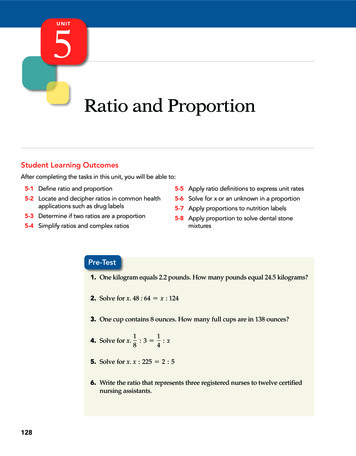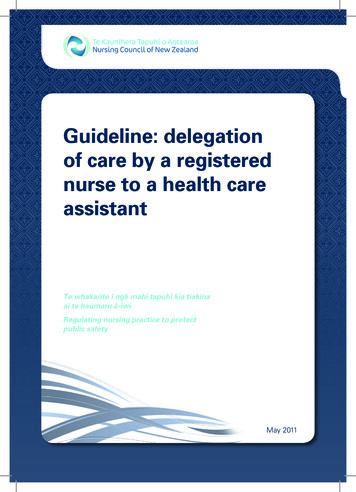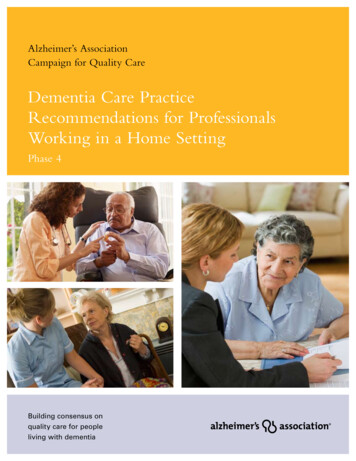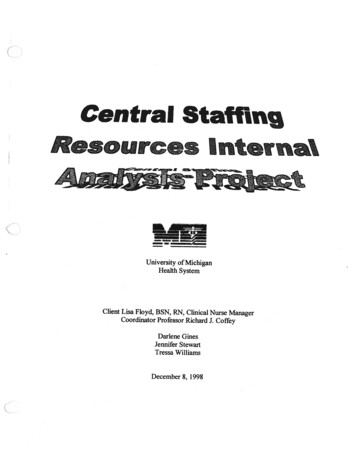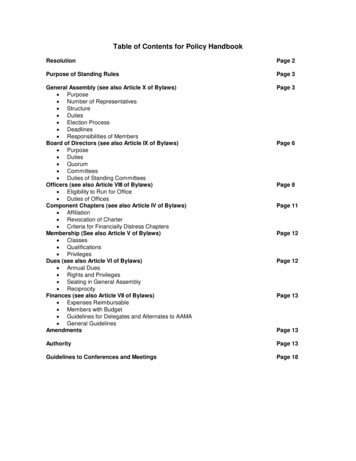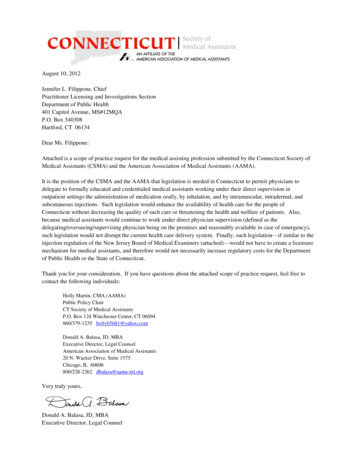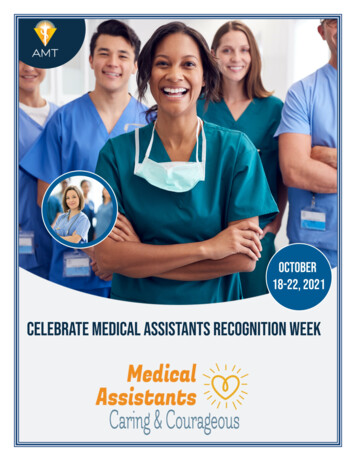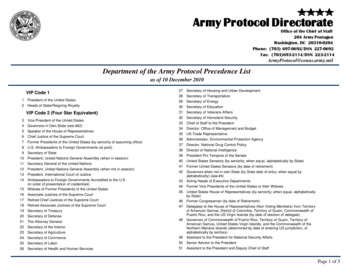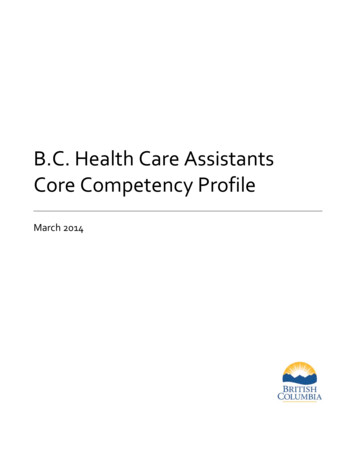
Transcription
B.C. Health Care AssistantsCore Competency ProfileMarch 2014
AcknowledgementsWe would like to greatfully acknowledge the project consultant Nancy Rigg (Eagle Vision ConsultingLtd.) for facilitating the review and for drafting this report.Thank you also to members of the Provincial Health Care Assistant Core Competency AdvisoryCommittee for their time and commitment in the development of the British Columbia Health CareAssistants Core Competency Profile.Kelly AckerManager, Manager, Strategic Planning Office toReduce Elder Abuse Seniors’ DirectorateClinical Nurse Educator-Home SupportMinistry of HealthSarina CorsiConsultant, Educational Assessment, BC CareAide and Community Health Worker RegistryHealth Employers Association ofB.C.Paul ClarkeHealth Education CoordinatorMinistry of Advanced EducationBryan DreilichManager, Health Actions, Aboriginal HealthDirectorateMinistry of HealthKim DuffusRegional DirectorSaint Elizabeth Health CareRaj GillHome Support Team LeaderFraser HealthCherry HarrimanDirector, Clinical Practice and EducationResidential & Assisted Living ProgramFraser HealthLuba HazeldinePolicy Analyst, Workforce Planning &Management, Health Sector Workforce DivisionMinistry of HealthJanet HebronChair, HCA Articulation Committee Chair,Faculty of Health and Human Services,Vancouver Island UniversityHealth Care AssistantsProvincial ArticulationCommitteeJas Khun KhunSenior Executive DirectorRivera Home HealthLori MacKenzie,Director, Research Universities, Healthand International Programs BranchDirector, Workforce Planning & Management,Health Sector Workforce DivisionMinistry of Advanced EducationJoanne MaclarenDirector, Professional Practice and LearningIsland HealthRobin McMillanDirector, Assisted Living Registrar, HealthServices Policy and Quality Assurance DivisionMinistry of HealthVivian ShumClinical Practice Leader, Residential PracticeTeamVancouver Coastal HealthMichelle AustriaDebbie McLachlanBayshore Health CareMinistry of HealthPage 1 of 15
Table of ContentsIntroduction . 3I. Competency Review Process . 4II. The Role of the Health Care Assistant . 5III. The Core Competency Profile . 61.0Competency: Health and Caring . 62.0Competency: Plan of Care . 73.0Competency: Communication Skills . 84.0Competency: Interdisciplinary Team Care . 95.0 Competency: Safety . 96.0 Competency: Responsibility, Accountability and Ethical Behaviour. 10IVNext Steps . 11Appendix A - The 2007 Framework . 12Appendix B – References . 13Appendix C – Glossary of Terms . 14Page 2 of 15
IntroductionHealth Care Assistants (HCAs) are front-line care providers who provide personal care assistance andservices in a variety of health care settings (acute care hospitals, assisted living, group homes,residential care and community care).In the province of British Columbia (BC) HCAs are not regulated by legislation or governed by aregulatory body and, therefore, they have no legally defined scope of practice. In order to establish aprovincial approach to HCA training, in 2006/07 the Ministry of Health funded the 2007 Care AideCompetency Project. The goal of the project was to identify and formalize the occupationalcompetencies for this key group of health care providers. With the overall aim of improving thestandards and delivery of quality care, the 2007 Care Aide Competency Project Framework of Practicefor Community Health Workers & Resident Care Attendants (the 2007 Framework) provided acomprehensive picture of the work done by HCAs and identified the competencies required for safetyand proficiency in their work (Appendix A). The 2007 Framework also provided the basis for thedevelopment of the 2008 HCA Provincial Curriculum that is the current standard for all educationalinstitutions offering the HCA program in BC.In the absence of a governing regulatory body for HCAs, in 2010, the Ministry of Health created theBC Health Care Aide and Community Health Worker Registry (the Registry). The Registry mandate is:1) To protect vulnerable patients, clients, and residents; 2) To establish and improve standards ofcare in the Care Aide and Community Health Worker occupations; and 3) To promote professionaldevelopment for Care Aides and Community Health Workers and to assist these workers inidentifying career opportunities. After an initial grand-parenting phase, the Registry set eligibilityrequirements for registration. In order to work for a publicly funded employer in BC HCAs are nowrequired to be registered with the Registry. HCAs trained in BC must provide evidence of graduationfrom a HCA program recognized by the Registry as meeting provincial training standards. Nursingstudent applicants and those with related health care education from outside of the province mustsupply proof of training and competency. Moving forward, the Registry will be promoting theprofessional development for HCAs, supporting their needs for continued learning and growth withinthe healthcare sector.As part of the Ministry of Health’s policy work, it is responsible for reviewing HCA competencies on aregular basis to ensure that basic competencies are meeting the needs of clients, families and thehealth care system as a whole. This updated HCA Core Competency Profile document replaces the2007 Framework and establishes a set of competencies (knowledge, skills, behaviours and attitudes)that HCAs in BC are expected to possess as an outcome of their baseline education. Thesecompetencies reflect the minimum standards required to ensure that HCAs provide the public withsafe, competent and ethical care. The HCA Core Competency Profile will be used as a guide by theMinistry of Advanced Education to review the 2008 HCA Provincial Education Curriculum to ensurethe educational preparation of these workers is current and relevant to the complex and changinghealthcare practice settings in which they work.Additionally, this document will also be an important resource to assist the public, employers, otherhealth care team members and HCAs to facilitate an understanding of the role, expectations andcompetencies of the HCA in BC.Page 3 of 15
I. Competency Review ProcessThe 2014 BC Health Care Assistant Core Competency Profile was developed with the expert advice ofthe Provincial HCA Core Competency Advisory Committee. Upon the recommendations of keystakeholders the committee was comprised of provincial leaders in the areas of HCA education andhealth care service delivery from the Ministry of Health, Ministry of Advanced Education, theRegistry, HCA Provincial Articulation Committee, Regional Health Authorities and service provideragencies.The following principles guided the review and development of the 2014 BC HCA Core CompetencyProfile: Core competencies will support entrance to practice in all health care settings;Best practices will be reflected in the core competencies;Recognition of an interdisciplinary approach and health care team collaboration;Consideration for: Acute care settings Integration of Aboriginal health Safe feeding techniques Client communication/conflict resolution abilities Recognition of elder abuse Diverse Populations - dementia, mental health and palliative clients.Key steps in the process utilized to develop the 2014 BC HCA Core Competency Profile were asfollows:1. The 2007 Care Aide Competency Project Framework of Practice for Community Health Workers &Resident Care Attendants (Appendix A) was utilized as the foundation upon which the HCA CoreCompetency Profile was developed. The five "Key Functions” and nine "Knowledge, Skills andSpecifications” in the 2007 Framework were consolidated to create six core competency themesof the HCA Core Competency Profile.2. A review of provincial and national documents related to HCA core competencies, HCAeducational standards and cultural educational competencies and standards was conducted toserve as a benchmark for comparison and inclusion (Appendix B).3. The 2014 BC HCA Core Competency Profile was developed and endorsed by the Provincial HCACore Competency Advisory Committee over the course of three facilitated teleconferencemeetings and through consultations with key individuals.Page 4 of 15
II. The Role of the Health Care AssistantHCAs are prepared to work in a variety of acute care, residential, home and community settings (e.g.independent, supportive care, assisted living, group home options, hospice/palliative care). They areimportant and valued members of the health care team. HCAs promote and maintain the health,safety, independence, comfort and well-being of individuals and families. HCAs provide personal careassistance and services in a caring manner that recognizes and supports the unique needs, abilitiesand backgrounds of clients and their families. They work as members of a health care team in avariety of settings with direction and supervision from regulated health care professionals. 1The work done by HCAs is based on a set of fundamental values, beliefs and ethical principles that areconsistently reflected in all aspects of their work with clients, families, team members and others.Amongst these core values, beliefs and principles, which serve as foundations of HCA practice, arethose related to:Human BeingsOlder AdultsHealth and HealingHealthcareCaring and Caregiving The Family in Health and Healing 2 In their daily practice HCAs perform the following functions: Use a problem solving approach to provide assistance and support that promotes the physical,emotional/psychological, social and spiritual health and well-being of clients and families; Communicate effectively with clients, families and other team members; Contribute to promoting and maintaining a safe and healthy environment for self, clients,residents and their families; Perform their job in an ethical, responsible and accountable manner, maintaining competentpractice, and Support the dignity, uniqueness and fair treatment of clients their families and others. 31Care Aide Competency Project Framework of Practice (2007). Ministry of Health, Government of British Columbia, p. 13Health Care Assistant Program Provincial Curriculum (2008). Ministry of Advanced Education and Labour Market Development,Government of British Columbia, p.4.3Care Aide Competency Project Framework of Practice (2007).Ministry of Health, Government of British Columbia, p.16.2Page 5 of 15
III. The Core Competency ProfileThe HCA Core Competency Profile has been arranged into six separate categories:1.2.3.4.5.6.Health and CaringPlan of CareCommunicationInterdisciplinary Team CareSafetyResponsibility, Accountability and Ethical BehaviourThese categories are further broken down into subcategories to reflect all the competencies requiredof the HCA at entry into practice in all health care settings (acute care, community, assisted living andresidential care). The Core Competency Profile lists the competencies that the new HCA entering intopractice must demonstrate knowledge and understanding of in order to become registered topractice in a publicly funded health care facility or program within BC. The Core Competency Profiledoes not list specific tasks or procedures as these can quickly become out-dated as a result of healthcare system changes.1.0Competency: Health and CaringAn essential practice requirement for HCAs is to promote and maintain health in a caringmanner. One of the primary functions is to provide care and support that promotes the physical,emotional/psychological, cultural, social and spiritual well-being of clients and their families. Thecompetency requires an HCA to:1.1Demonstrates compassionate culturally safe, relationship centred care with the client andtheir family.1.2Recognizes and respects the uniqueness, diversity, rights, and concerns of the client andtheir family.1.3Recognizes and responds to the client s specific needs.1.41.5Demonstrates the ability to observe and report within the parameters of their work.Organizes and uses time efficiently.1.6Recognizes the effect of illness, behaviour, stress and disability on clients and familyrelationships.Uses knowledge of the basic principles of growth and development, communication, andpsychosocial dimensions of human behaviour to provide safe and competent care.Uses knowledge of the aging process and related health and chronic conditions to providesafe competent care.Provides individualized age appropriate client-centered care, with a focus on physical,psychological, social, emotional cognitive, cultural and spiritual support in a variety ofpractice settings.Demonstrates an understanding of how the HCAs practice affects the overall quality ofcare provided to clients in the assigned work setting.1.71.81.91.10Page 6 of 15
2.0Competency: Plan of CareAn essential practice requirement for HCAs is the provision of care in a manner that recognizesand supports the unique needs, abilities and backgrounds of clients. Care activities are directedto supporting, promoting and maintaining the health, safety, independence, comfort and wellbeing of clients in all care settings. The competency requires an HCA to:2.1Demonstrates an ability to plan and implement care based on the client’s health status;physical, emotional, social and spiritual well-being; and to take action in collaborationwith the health care team.2.2Assists the client and their family to be involved in care activities and self-careactivities as appropriate.2.3Understands and demonstrates the principles of client-centered care and promotingindependence.2.4Reports any observed improvements and difficulties with response to care to healthcareprofessionals.2.5Provides individualized client-centered care to support the client’s requirements foractivities of daily living to be met (e.g. hygiene, oral care, nutrition, rest, andmobilization).2.6In accordance with the plan of care assists with specific tasks related to medicationadministration as delegated by a nurse.2.7Demonstrates an ability to provide basic palliative care:2.7.1 Demonstrates an understanding of the beliefs, values, legal and ethical issuesrelated to caring for the dying person.2.7.2 Demonstrates sensitivity and understanding of different spiritual and culturalresponses to death, dying and the afterlife.2.8Demonstrates an ability to care for individuals with cognitive and or mental healthchallenges including dementia and delirium:2.8.1 Demonstrates knowledge of the effect of the environment on individuals withcognitive and mental health challenges.2.9Appreciates the potential value of traditional medicines and alternate forms of healingto the client and their family.2.10 Demonstrates the ability to provide individualized client-centered care for the clientsexperiencing cognitive and/or mental health challenges, and/or responsive behaviours.2.11 Implements special procedures and protocols as directed, to meet unique requirementsrelated to specific client conditions.Page 7 of 15
3.0Competency: Communication SkillsAn essential practice requirement for HCAs is the ability to communicate effectively with clients,families and other team members. As front-line workers, it is critical that HCAs are able todevelop and maintain effective caring relationships with clients and families. The competencyrequires an HCA to:3.1Communicates effectively and in a culturally safe manner with the client, family, andthe health care team.3.2Demonstrates proficiency in verbal, nonverbal, and written skills and the use of theEnglish language through a variety of communication methods:a. Written documentation – Electronic/paper client chart and emails.b. Verbal communication – Telephone and in-person communication, etc.3.3Demonstrates the ability to use current computer technology in accordance withworkplace standards.3.4Demonstrates the ability to record and document to ensure an accurate and clear recordof care provided.3.5Demonstrates appropriate use of health care terminology and abbreviations.3.6Demonstrates knowledge and understanding on how to communicate effectively withthe client with cognitive and mental health challenges.3.61 Recognizes triggers early and responds appropriately to deescalate the situation.3.7Appropriately communicates information about the client’s needs while respectingconfidentiality and legally regulated requirements (e.g. pursuant to Privacy and PersonPlanning Legislation, Freedom of Information and Protection of Privacy Act andRestraining Orders).3.8Utilizes active listening to communicate respectfully and compassionately with theclient, family, and health care team member(s).Page 8 of 15
4.0Competency: Interdisciplinary Team CareAn essential practice requirement of the HCAs practice is the ability to work collaboratively withall members of the health care team to reach a common goal in the provision of safe, competentand ethical care to clients and their families. The competency requires an HCA to:4.1Works collaboratively with other health care team members to ensure appropriate careto clients.4.2Demonstrates the ability to communicate changes in the client’s health status promptlyand as required at team meetings and conferences.4.3Follows up with appropriate member(s) of the team to ensure reported needs have beenacted upon.4.4Recognizes when to ask for help and seek clarification when a situation changes ordirections are not clear.4.5Recognizes and demonstrates an understanding of the role of the health care team androle of the HCA within the team.4.6Articulates and maintains values and best practices as it relates to the client.4.7Understands when to seek help from other members of the health care team when caredemands exceed scope of personal competence.4.8Recognizes and respects the diversity within the health care team.4.9Participates in the discussions regarding the client, contributing relevant observationsand information.4.10 Uses appropriate strategies in providing and receiving feedback within the health careteam.5.0 Competency: SafetyAn essential practice requirement for HCAs relates to providing care and services that promoteand maintain the safety and well-being of clients and families in addition to attention topersonal safety and job stressors. The competency requires an HCA to:5.1Promotes and recognizes safety risks and implements appropriate safety measures.5.2Adheres to health and safety standards.5.3Demonstrates correct use of body mechanics at all times.5.4Demonstrates the ability to operate equipment safely.5.5Responds appropriately to client behaviors to prevent injury to client, self and others.5.6Recognizes the importance and demonstrates the ability to care for themselves usinghealth and wellness strategies and musculoskeletal skeletal injury prevention.5.7Recognizes and responds quickly and appropriately to emergency situations.5.8Recognizes, prevents and responds to potential or suspected abuse, neglect and selfneglect.5.9Recognizes and responds to potential risks such as falls, suicide, and choking.5.10 Demonstrates effective infection control practices.5.11 Implements preventative measures to mitigate harm to self and others (falls, safefeeding, safe mobilization, etc.)Page 9 of 15
6.0 Competency: Responsibility, Accountability and Ethical BehaviourAn essential practice requirement for HCAs is to perform their job in an ethical, responsibleand accountable manner. Since HCAs are neither licensed nor monitored by a regulatorybody they do not have a legally defined scope of practice. It is imperative, therefore, thatHCAs have a thorough understanding of the expectations and parameters of their job roles.The competency requires an HCA to:6.1Understands own values and attitudes and their effect on client’s rights to establishsuccessful client-caregiver relationships.6.2Understands and applies principles and guidelines to respect the rights of clients (e.g.privacy, confidentiality and legislation).6.3Demonstrates an understanding of the ethical standards and legal requirement,expected in the provision of care.6.4Takes responsibility for their own performance and actions.6.5Demonstrates the ability to self-evaluate on the basis of “best practices” and makeimprovements in own practice as needed.6.6Incorporates new knowledge into client care and shares knowledge with others.6.7Understands the need for and values continued learning.6.8Demonstrates an awareness of and maintains appropriate boundaries in providerclient and provider-family relationships.6.9Educates others about the roles and contributions of HCA.6.10 Recognizes current abilities and seeks guidance as appropriate.6.11 Demonstrates the ability to evaluate the effectiveness of own actions.Page 10 of 15
IVNext StepsThe 2014 BC Health Care Assistant Core Competency Profile clearly outlines the entry level corecompetencies required for HCAs to begin practice within BC. The HCA Core Competency Profilereflects the changing environments in which HCAs are now practicing within BC and supports theintegration of HCAs as integral members of the health care team in all health care settings. The HCACompetency Profile will be utilized by the Ministry of Advanced Education to guide the review of the2008 Provincial HCA Curriculum to ensure that the educational preparation of HCAs is current,relevant and meets the changing needs of clients, their families and the health care system within BC.This document will also serve the public, employers and other health care team members includingHCAs themselves in developing their understanding and appreciation of the role and competencies ofthe HCA.Page 11 of 15
Appendix A - The 2007 FrameworkAs HCA’s do not have a legally defined scope of practice, the 2007 Care Aide Framework of Practice,provided below, was developed to identify the basic occupational competencies and standards forHCA’s to practice in BC. The 2007 Framework provides a comprehensive picture of the work done byHCAs and identifies the functions and skills required for safe, proficient performance of the job role.The 2007 Framework describes what HCA’s do, how they do it, and why. The 2007 Framework wasused as the basis for the development of the 2008 HCA provincial curriculum and subsequently the2014 BC HCA Core Competency Profile.Page 12 of 15
Appendix B – ReferencesList of Relevant Provincial and National Competency Documents and FrameworksBaseline Competencies for Licensed Practical Nurses’ Professional Practice. Ensuring Safe,Competent and Ethical Nursing Practice in BC. College of Licensed Practical Nurses of BC, February2009.Canadian Education Standards for Personal Care Workers, Environmental Scan (2012). PromotingMobility and Recognition: National Educational Standards for Personal Care Providers. Health CanadaLast revised: June 28, 2012.Canadian Educational Standards for Personal Care Providers, A Reference Guide. Promoting Mobilityand Recognition: National Educational Standards for Personal Care Providers Health. Last revised:June 28, 2012.Care Aide Competency Project Framework of Practice, Ministry of Health, Government of BritishColumbia, July, 2007.Cultural Competency and Cultural Safety Curriculum for Aboriginal Peoples. Aboriginal CulturalCompetency and Cultural Safety Curriculum Aboriginal Nurses Association of Canada.Cultural Competency and Cultural Safety Curriculum for Aboriginal Peoples. A Framework for FirstNations, Inuit and Metis Nursing. Aboriginal Nurses Association, 2009.Health Care Aides Competency Profile, Alberta Health and Wellness, November 2001.Health Care Assistant Program Provincial Curriculum, Ministry of Advanced Education and LabourMarket Development, Government of British Columbia, 2008.Scope of Practice of the Continuing Care Assistant (CCA) in Nova Scotia, April 2009.The British Columbia Competency Framework for Inter-professional Collaboration. College of HealthDisciplines and BC Inter-professional Network, 2008.Page 13 of 15
Appendix C – Glossary of TermsAbuse:The deliberate mistreatment of an adult thatcauses the adult (a) physical, mental or emotionalharm, or (b) damage to or loss of assets, andincludes intimidation, humiliation, physical assault,sexual assault, overmedication, withholdingneeded medication, censoring mail, invasion ordenial of privacy or denial of access to visitors. 4(Abuse of children is defined under child abuse).Age Appropriate Care:All individuals with client contact have theeducation and training related to thecharacteristics and needs of the age groups theycome in contact with and are able to respond toage specific health care issues. Care is tailored to aclient’s physical and mental attributes andcapacities, which are based in part on a clients’ ageand their stage of psychosocial development.Client:An individual or group of individuals who requirepersonal care and support services from HCAs. Insome clinical settings, the client may be referred toas a patient or a resident. Where this term is used,it should be taken to mean anyone receiving care.Client-Centred Care:Involves advocacy, empowerment, and respectingthe clients’ autonomy, voice, values, selfdetermination and participation in decision making.Collaboration:Is a process that requires relationships andinteractions between health providers regardless ofwhether they are members of a formalized team ora less formal group of health professionals workingtogether to provide comprehensive and continuousgoal oriented care to a client. 5Competencies:The specific knowledge, understandings, skills,values and judgments used by HCA in order toprovide safe, proficient care for individuals in avariety of institutional and community settings. 6Conflict Resolution:Various ways in which individuals or institutionsaddress conflict (e.g., interpersonal, work) in orderto move toward positive change and growth.Effective conflict resolution requires criticalreflection, diplomacy, and respect for diverseperspectives, interests, skills, and abilities. 7Core Competencies:The minimal competency requirements for HCAswhich are common to all service settings in thehealth system in BC including: (i) acute care and (ii)Home and Community Care (home care, assistedliving, group home, hospice and residential care).Cultural Safety:Sensitivity to culture and cultural differences,including recognition of the importance ofrespecting differences. It is also important tounderstand that power differentials, which are partof providing care, impact on cultural safety. 8Diversity:Based on the understanding that each individual isunique, the concept of diversity encompassesacceptance and respect. These differences includeculture, race, ethnicity, gender, sexual orientation,socioeconomic status, age, physical abilities,religious beliefs, political beliefs and ideology. 96BC Care Aide Competency Project Framework (2007).Standards of Practice for Registered Nurses, (2012) College ofRegistered Nurses of Nova Scotia.784Model Core Program Paper: Prevention of Violence, Abuse &Neglect(2010) el-corereview.html5Canadian Health Services Research Foundation. Teamwork inHealthcare: Promoting effective teamwork in healthcare in Canada.www.chsrf.ca.Adapted from Aboriginal Nurses Association of Canada, CanadianAssociation of Schools of Nursing & CanadianNurses Association (2009b). Inuit and Métis Cultural Competence andCultural Safety in First Nations, NursingEducation: An Integrated Review of the Literature. Ottawa: ANA9Baseline Competencies for Licensed Practical Nurses’ ProfessionalPractice. Ensuring Safe, Competent and Ethical Nursing Practice in BC,(2009). College of Licensed Practical Nurses of BC, February 2009.Page 14 of 15
Family:The family members and significant others in thelife of the client. It is a broadly defined term toinclude families of origin, families of choice andpersons of representation.Health Care Assistants:In BC, the term HCAs is used to describe a variety ofworkers including, but not limited to, the followingjob titles: Community Health Workers, ResidentCare Attendants, Care Aides, Home SupportWorkers, Nurse Aides, and Personal SupportWorkers. HCAs are unregulated health careproviders who are not part of a regulated healthprofession. HCAs may deliver some basic elementsof care such as personal hygiene, dressing, andfeeding and medication assistance under theguidance or a regulated health care professional.Health Care Team:Individuals who by working together providehealth, personal and supportive care to clients. Theteam may consist of, but is not limited to, differen
The work done by HCAs is based on a set of fundamental values, beliefs and ethical principles that are consistently reflected in all aspects of their work with clients, families, team members and others. Amongst these core values, beliefs and principles, which serve as foundations of HCA practice, are those related to:
